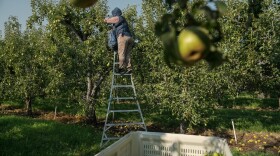-
Gov. Ron DeSantis and the Florida Cabinet approved the expenditure as part of $27 million to protect 21,500 acres of conservation and agricultural lands statewide.
-
Agricultural workers recount working in extreme heat while expecting. Advocates say more protections are needed to ensure the health and well-being of the expectant moms and their babies.
-
Marco Antonio Hernandez Guevara, who had been working in the U.S. under the H-2A program, is believed to be the first known agriculture worker in the region to die from heat-related causes.
-
Once the seeds return to Earth, scientists will examine their appearance, extract DNA to study genetic changes and test their physiology.
-
The prototype will soon be tested at select farms within Immokalee in Collier County and Ona in Hardee County.
-
Robert Guenther, executive vice president of the Florida Tomato Exchange, said the duty was "an enormous victory for American tomato farmers and American agriculture."
-
UF/IFAS researchers are testing how effective these products are by putting them in mesh bags and burying them alongside corn and cotton crops.
-
The bill would provide coverage to Florida Farm Bureau members that would not be subject to the same state and federal regulations as health insurance.
-
Northern District of Florida Chief Judge Mark Walker declined to dismiss a part of the lawsuit that argued restrictions give an unconstitutional advantage to Florida farmers over out-of-state competitors.
-
The wide-ranging agriculture legislation would ban fluoride in Florida's public water systems and prohibit plant-based products from being labeled as meat or milk.
-
Gov. Ron DeSantis announced at the Florida State Fairgrounds in Tampa that more interest-free disaster loans up to $500,000 will be available for eligible farmers, ranchers and growers.
-
Use of technology and growing more on less land are major keys to survival for the Florida agriculture industry.
Play Live Radio
Next Up:
0:00
0:00
Available On Air Stations












